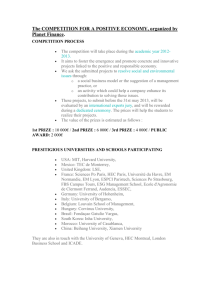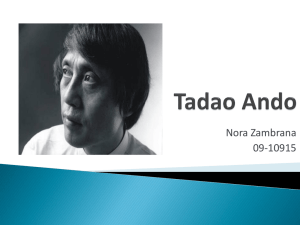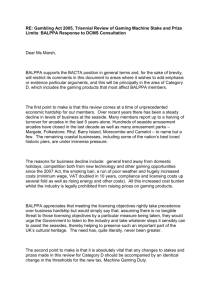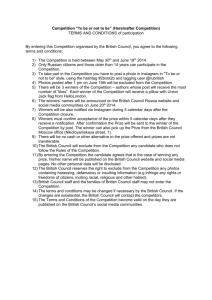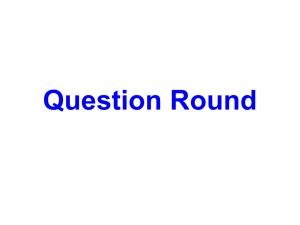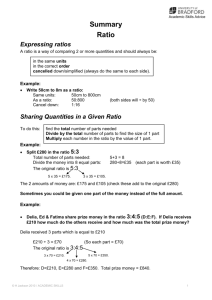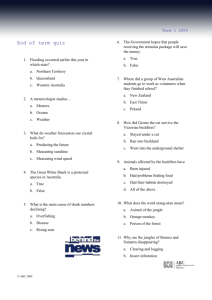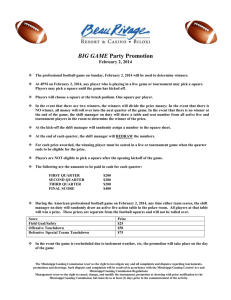Gambling Act 2005: Triennial Review of Gaming Machine
advertisement
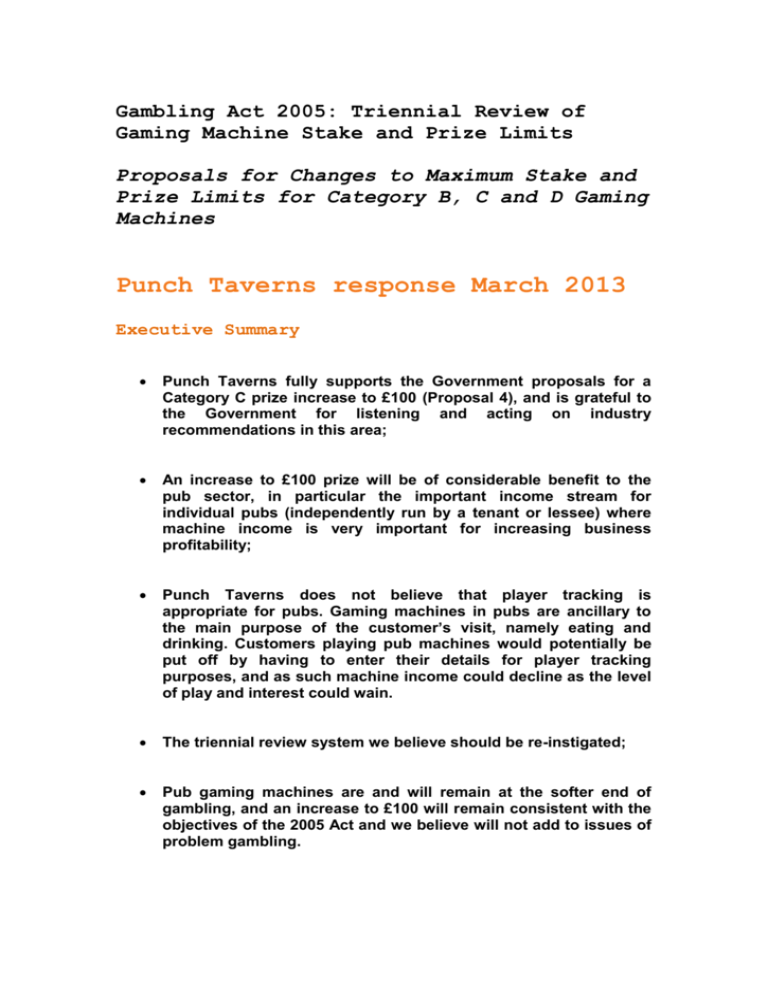
Gambling Act 2005: Triennial Review of Gaming Machine Stake and Prize Limits Proposals for Changes to Maximum Stake and Prize Limits for Category B, C and D Gaming Machines Punch Taverns response March 2013 Executive Summary Punch Taverns fully supports the Government proposals for a Category C prize increase to £100 (Proposal 4), and is grateful to the Government for listening and acting on industry recommendations in this area; An increase to £100 prize will be of considerable benefit to the pub sector, in particular the important income stream for individual pubs (independently run by a tenant or lessee) where machine income is very important for increasing business profitability; Punch Taverns does not believe that player tracking is appropriate for pubs. Gaming machines in pubs are ancillary to the main purpose of the customer’s visit, namely eating and drinking. Customers playing pub machines would potentially be put off by having to enter their details for player tracking purposes, and as such machine income could decline as the level of play and interest could wain. The triennial review system we believe should be re-instigated; Pub gaming machines are and will remain at the softer end of gambling, and an increase to £100 will remain consistent with the objectives of the 2005 Act and we believe will not add to issues of problem gambling. Introduction Punch Taverns is one of the UK’s largest leased pub companies with a portfolio of around 4,500 pubs nationwide. These are operated by thousands of enterprising individuals - our partners – who are running their own pub businesses in our premises. Punch Taverns is grateful to the Government for listening to the concerns of the pub sector during the triennial consultation exercise in 2012, and as such supports the Government’s proposal for revising the prize limits for Category C machines (of which we estimate there are 55,000 in the pub sector alone) from the current maximum of £70 to £100. We support the maximum stake remaining unchanged at £1. The pub plays a vital role in community cohesion and social life in Britain. They are frequently one of the few remaining places where communities come together to socialise. The British pub has been part of people's lives for hundreds of years. First and foremost, they are businesses which serve their local communities and contribute much to the social life of each and every community. The pub sector has enormous potential to generate economic growth and create jobs. It can also play an important part in local regeneration projects, and has been at the heart of the regeneration of many of our key towns and cities over the last fifteen years. A major study undertaken by Oxford Economics in 2011 clearly identifies the significant local impact of the pub sector, and concludes that the pub sector is a major employer across the UK. In total, the pub sector is estimated to sustain over 650,000 direct jobs across the UK and almost £12bn of wages. The income from an increase in prize for Category C machines will enable tenanats and lessees to invest in their businesses and keep an important social resource viable. Land-based businesses such as pubs are highly labour intensive (as noted above) and thereby contribute to local jobs and profit in communities whereas on-line gambling, for example, is not labour intensive and does not feed directly into community benefit. The income derived from gaming machines is important to the economics of many pubs, and for some can have a key affect on their viability. The growth in competition from other gambling products over recent years has affected the pub industry’s ability to match the level of machine entertainment and prize value offered which is increasingly demanded by its customers. Pubs have found it more and more difficult to compete with more attractive gambling offers on the high street which has resulted in a continued decline of revenues derived from gaming : Examples of the increased competitive market compared to the pub industry : FOBT machines offering a prize value up to £500 in licensed betting shops Varied Lottery Games including Health lotteries Smartphones and handheld devices offering various on line gambling options with no time limits on availability to play Bingo venues offering prizes up to £500 We would take this opportunity to stress that pubs wish to remain a soft gaming environment and have no wish to change the nature of their traditional offering. However the stake and prize level currently on offer in pubs does not meet the expectations of the consumer in comparison to what is available from other forms of gaming and venues . Consultation Question Responses Question 1: How often should government schedule these reviews? Please explain the reasons for any timeframes put forward for consideration. Unlike the vast majority of consumer leisure activities, the maximum stakes and prizes of gaming machines are set by Parliament. Stake and prize levels represent the price charged to the consumer and the maximum value offered. Changes in stake and prize are the only mechanism in a highly regulated environment that allows the industry to meet customer demand in an everincreasingly competitive leisure market, and to address increasing costs. Prior to the Gambling Act 2005 the stakes and prizes for gaming machines followed a regular and routine review every three years (the Triennial Review) to allow for stake and prize levels to be updated. As part of this process, the industry presented evidence to the regulator and Government of why and to what extent stakes and prizes should be permitted a modest increase, to meet customer demand whilst continuing to be socially responsible. The Triennial system allowed the industry to plan - manufacturers could work to a three year development cycle and the industry could plan its purchasing strategy. The last Triennial review was conducted by the then Gaming Board in 2001, but the process was then suspended in 2004 while the 2005 Bill was in construction and has not been reintroduced. The triennial review system in place before the introduction of the Gambling Act 2005 should be reintroduced. Question 2: The government would like to hear about any types of consumer protection measures that have been trialled internationally, which have been found to be most effective and whether there is any consensus in international research as to the most effective forms of machine-based interventions. The government would also like to hear views about any potential issues around data protection and how these might be addressed. Punch Taverns only operates in Scotland, England and Wales and does not have any research relating to international activity. Question 3: The government would like to hear from gambling businesses, including operators, manufacturers and suppliers as to whether they would be prepared to in the future develop tracking technology in order to better utilise customer information for player protection purposes in exchange for potentially greater freedoms around stake and prize limits. Punch Taverns does not believe that player tracking is appropriate for pubs. Gaming machines in pubs are ancillary to the main purpose of the customer’s visit, namely eating and drinking. Customers playing pub machines we believe would not respond well to a requirement to enter their details for player tracking purposes, and as such machine income could decline as the level of play could wain. The cost of implementing player tracking would be prohibitively expensive and would result in the removal of machines from pubs. The cost of gathering such information for player tracking is likely to be significant on nonnetworked, analogue machines that form 95 +% of the pub gaming machine market. Package 1: Question 4: Do you agree that the government is right to reject Package 1? If not, why not? Yes. Package 2: Question 5: Do you agree that the government is right to reject Package 2? If not, why not? Yes. Package 3: Question 6: Do you agree with the government’s assessment of the proposals put forward by the industry (Package 3)? If not, please provide evidence to support your view. Yes. Question 7 – 22: Punch Taverns has no comments to make on these questions. Package 4: Category C Question 23: Do you agree with the government’s proposal to increase the maximum prize to £100 for category C machines? Yes. Punch Taverns are grateful that the Government has taken into account the representations of the industry and agreed to recommend an increase in prize to £100 for Category C machines. As stated in the impact assessment, the previous increase in 2009 to £1 stake and £70 prize did give an uplift to pub sector machine revenues (albeit spread over a longer time period for tenanted/freehold pubs than the immediate effect felt by managed operators) We are in strong agreement with the Government that an increase in the maximum prize limit to £100 could deliver significant benefit to the pub machine sector, as well as the resultant positive impact on the manufacture and supply of Category C machines. Many licensees (i.e. independent businessmen and women) have reduced staffing levels due to the current economic conditions. These licensees are working longer hours to sustain their businesses. Additional income generated by a £100 prize would be welcomed by our tenants and lessees as additional profit could be invested in staff that in turn would help the pub flourish. Protecting and growing machine income will protect and grow jobs in pubs, operators and manufacturers. With regard to pub companies, an increase in machine numbers could create additional roles in account management within pub operating companies. Additional new machines being built as a consequence of an increase in machine income from a £100 prize would assist in securing and creating jobs in the manufacturing sector. Without prize increase we believe that the decline will continue leading to further job losses throughout the machine supply chain. At the time of the last stake and prize review BACTA commissioned research by BrandDriver which demonstrated a much greater support from consumers for a £1 maximum stake/ £100 maximum prize compared to £1 / £70. There is therefore we believe a latent demand for this level of prize payout. There are other considerations which also support the principle for an increase in prize level. A £100 prize will allow manufacturers to develop games offering a greater variety of gaming / entertainment experiences for a customer whose choices have increasing competition from competing leisure offers. A £100 prize will encourage innovation and flexibility of game design increasing consumer choice. £100 would represent the maximum prize, however, operators would be able to offer many smaller prizes within this limit affording consumer choice as evidenced on other products offering higher prize opportunities. An increase in stake and prize to £100 is truly needed if venues offering Category C products are to have a more robust opportunity to compete. Question 24: Do you consider that this increase will provide sufficient benefit to industry sectors, whilst also remaining consistent with the licensing objectives of the Gambling Act? Yes. This increase, as discussed would provide increased benefits to the pub sector. Regarding any concerns over social responsibility issues as a result of a stake and prize increase for Category C machines we believe that there is now more protection in law than ever before. The Gambling Act 2005 has considerably strengthened the responsibilities of businesses through the introduction of statutory Gambling Commission Codes of Practice and the minimum age limit on playing Category C machines. Punch Taverns have supported the process of ensuring that underage access to gaming machines in pubs (already a heavily regulated and supervised environment) is restricted – previous advertising of the 2009 increase in prize to £70 prominently featured ‘no under 18s to play’ messaging, in addition to the Gamcare helpline number. Similar messages will be included in any £100 customer-facing advertising endorsed by the Association. Example of £70 prize advertising featuring social responsibility messaging (2009) To satisfy any concerns over the potential impact of changes there have been three major surveys conducted looking at the levels of problem gambling in the UK. Two of these surveys looked at the period before the Gambling Act 2005 came into effect, in 1999 and 2007. The 2010 Survey, published in February 2011, reviewed the impact based on pre-and post-2005 Act implementation to compare the two scenarios. The 2010 study found that 0.9% of adults were ‘problem gamblers’. Problem gambling prevalence was higher in 2010 than in 2007 and 1999 (0.6% for both years). However, the Prevalence Survey accepted that this small increase was at the margins of statistical significance. The number of people playing gaming machines actually dropped in 2010 (14% in both 1999 and 2007; 13% in 2010) however this was not split out by machine category. Of all gamblers, a low proportion (4%) had problems attributable to gaming machines. Overall, whilst there was a slight rise in 2010 post implementation of the Act, this was of little statistical significance and there is no evidence to suggest problem gambling has significantly increased since the Act came in and certainly not with gaming machines located in pubs where income and machine numbers have declined. Punch Taverns have traditionally supported and promoted responsible gambling, initially via GamCare and latterly thorough the more recent arrangements put in place where contributions are collected by the Responsible Gambling Trust. Punch Taverns have contributed in proportion to the amount of gambling involved in the sector, and continues to support research, education and treatment into problem gambling. There is no evidence to suggest that an increase of prize to £100 for Category C machines would add to problem gambling issues.. Package 4: Category D It should be noted that where prize increases are proposed for Category D machines, a number of these will be pushed into the higher rate of Machine Games Duty (MGD) further highlighting the disconnect between social and tax legislation. The thresholds for the lower rate of MGD should be increased in line with prize increases to ensure Category D machines do not become subject to the 20% rate of taxation. Question 25: Do you agree with the government’s proposal to increase the maximum stake to £2 and the maximum prize to £60 for category D crane grab machines? If not, why not? Yes. Question 26: Do you agree with the government’s proposal to increase the maximum stake to 20p and the maximum prize to £6 for category D complex (reel based) machines? If not, why not? Yes. Question 27: Do you agree with the government’s proposal to increase the maximum stake to 20p and the maximum prize to £20 (of which no more than £10 may be a money prize) for category D coin pusher machines? If not, why not? Yes. Question 28: Do you consider that the increases will provide sufficient benefit to the arcade sector, whilst also remaining consistent with the licensing objectives of the Gambling Act? Yes. Question 29: Are there any other options that should be considered? No. Costs and benefits: Question 30: Do you agree with the methodology used in the impact assessment to assess the costs and benefits of the proposed measures? If not, why not? (Please provide evidence to support your answer) Yes. Question 31: Do you agree with the government’s approach to monitoring and evaluating the impact of changes to inform future reviews? If not, why not? (Please provide evidence to support your answer) No comment. Question 32: What other evidence would stakeholders be able to provide to help monitoring and evaluation? No comment; as it is not clear how this could operate effectively in pubs. Prize gaming: Question 33: Are there other sectors in addition to bingo that currently provide gaming under prize gaming rules? No comment. Question 34: Were the Government to change the stake and prize limits (including aggregate limits), would this encourage more operators to offer prize gaming? No comment. Question 35: What type of products would the industry look to offer as a result of the proposals? No comment.
